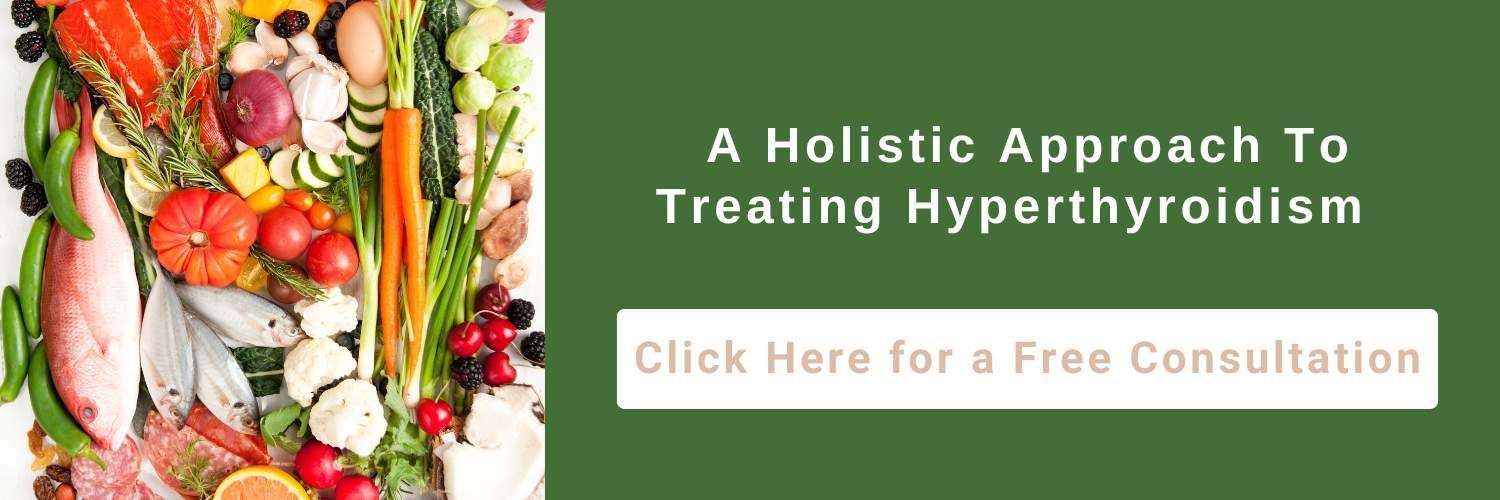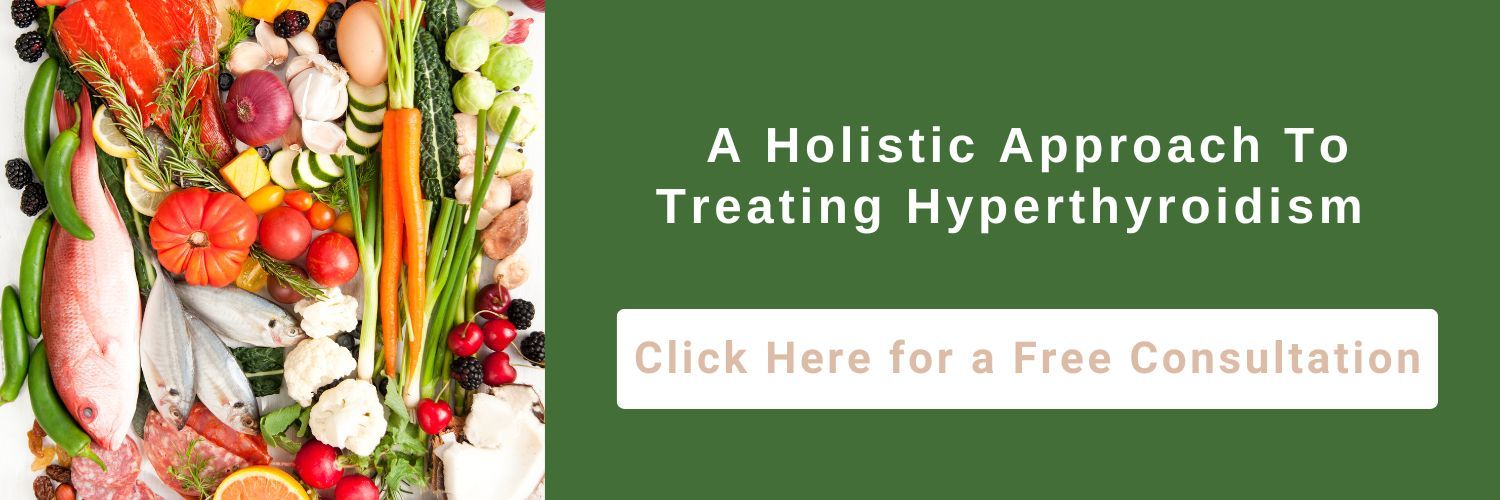Does Hyperthyroidism Cause Fatigue? A Holistic Look at Energy, Hormones & Healing
When facing a health issue, such as hyperthyroidism, it can be tempting to search for its cause. You may wonder: Can hyperthyroidism be caused by stress?
And you aren’t alone– it is a popular online search filled with many people wondering about the connection. Stress is known to impact the body in numerous ways, including hormonal imbalances, which may complicate thyroid disorders.
This article will discuss the connection between stress and hyperthyroidism, how stress exacerbates symptoms, and how to minimize stress in your daily life. Understanding this link between stress and the thyroid can empower you to take better control of your thyroid health, manage your symptoms better, and improve your well-being for the long term.
Table of Contents
Why Does Hyperthyroidism Cause Fatigue?
So much about our health seems counterintuitive that we might be tempted to become despondent — do we really have any control over our health?
You may feel perplexed about having fatigue with hyperthyroidism, but
HealthierU can bring clarity to your situation and empower you to improve it.
The Burnout Behind the Buzz
Overproduction of thyroid hormone is the hallmark of hyperthyroidism. Thyroid hormone increases sensitivity of the body’s tissues to catecholamines (epinephrine and norepinephrine), allowing you to enter fight or flight mode by increasing heart rate and blood pressure.
A chronic excess of thyroid hormone causes this state to persist indefinitely so that you are in a continuous state of tension, even anxiety. This, along with a faster heart rate, can disturb sleep and contribute to both physical and
emotional fatigue.
The Role of Sleep Disruption in Chronic Fatigue
Besides tension and anxiety, other symptoms associated with hyperthyroidism may lead to insomnia in hyperthyroid patients. These include:
- Difficulty falling and staying asleep
- Daytime sleepiness
- Tremors
- Changes in appetite, bowel movements, and mood
There are several ways that people with sleep issues can try to calm their nervous system. Try some of these to improve your sleep duration and quality:
- Deep breathing exercises
- Using a weighted blanket
- Physical exercise
- Meditation or mindfulness
- Grounding and spending time in nature
- Cold showers
- Emotional freedom techniques (i.e. “tapping”)
Nervous System Overdrive and Adrenal Fatigue
Because high thyroid hormone levels continually signal the adrenal glands to secrete catecholamines and cortisol, the adrenals eventually become worn down, causing intense fatigue.
Continual nervous system stimulation may
lead to nerve damage, neuropathy, mood and cognitive disorders, and tremors. Neuropathy is not very common, but it does happen to some hyperthyroid patients.
Gut Health and Essential Nutrient Deficiency
As the body with excess thyroid hormone is in a hypermetabolic state, nutrients are quickly depleted. The hypermotility of the gut, which may present as diarrhea or frequent bowel movements, decreases the time that nutrients have to be absorbed.
Malabsorption of nutrients may also be caused by inflammation, another possible symptom of hyperthyroidism, and lead to further thyroid dysfunction. The following vitamins and minerals contribute to whether the thyroid functions too productively or not productively enough.
- Vitamins D and B12: Patients with hyperthyroidism resulting from an autoimmune thyroid disease are at risk for developing a deficiency of vitamin D and vitamin B12.
- Magnesium: Low levels of this mineral are associated with physical and psychological stressors in patients with hyperthyroidism.
- Selenium: Individuals with selenium deficiency are at greater risk of developing Graves’ disease, the autoimmune condition associated with hyperthyroidism.
- Zinc: High amounts of
this thyroid-stimulating nutrient in your diet may contribute to the development of hyperthyroidism.
What Does Hyperthyroid Fatigue Feel Like?
Hyperthyroid fatigue goes beyond tiredness to a feeling of whole-body exhaustion. This extreme low energy state, perhaps accompanied by muscle weakness and pain, may persist to such a degree that the person may have difficulty concentrating and begin to experience depression and a lack of motivation to carry out normal responsibilities.
Now that you understand
why hyperthyroidism causes fatigue, take heart in knowing that there are steps you can take to restore your energy.
Food, Fatigue & Thyroid Support: What To Eat (and Avoid)
Adjusting your diet to include the best foods for thyroid health and exclude those that might exacerbate your problem may significantly improve your symptoms.
Extreme exclusionary diets (keto, vegan, etc.) are not recommended, as they could leave you deficient in important nutrients. High-calorie, nutrient-dense foods are what you want to shoot for, though some things you should avoid as much as possible.
Energy-Boosting Foods for Thyroid Health
Fermented Foods
Insofar as fermented foods improve gut health, they may help to regulate the thyroid. The connection between the thyroid and the gut (referred to as the thyroid-gut axis) is seen in the way the bacterial organisms living in the gut regulate immune cell development.
Poor gut health leads to chronic inflammation, which is a situation out of which autoimmunity often develops. Autoimmunity is one of the major causes of hyperthyroidism. A healthy gut that is not chronically inflamed may help prevent hyperthyroidism caused by Graves’ disease, an autoimmune condition.
Fermented foods include kimchi, kefir, sauerkraut, and kombucha. They contain probiotics that are excellent for maintaining healthy gut bacteria.
Fatty Fish
Hyperthyroidism’s negative impact on bone health requires that patients take precautions to protect their bones. The vitamin D in fatty fish, such as salmon, may help your body absorb calcium better, keeping your bones strong.
Fatty fish also contain a significant amount of omega-3 fatty acids, the anti-inflammatory properties of which are beneficial for preventing inflammation. Omega-3s, also found in olive oil, may aid the
liver negatively impacted by hyperthyroidism.
Whole Grains
These nutrient-dense foods help energize you when you are fatigued. While all do not contain the same nutrients, whole grains are generally rich in vitamin A, vitamin E, the B vitamins, iron, magnesium, phosphorus, and selenium.
The fiber in whole grains may also help calm digestion, which tends to be sped up in patients with hyperthyroidism. Whole grains include quinoa, oats, brown rice, and sprouts.
Leafy greens
Have a salad alongside your fatty fish. Whereas vitamin D improves your body’s ability to absorb calcium, leafy greens give you calcium in the first place, helping to prevent osteoporosis. Spinach and collard greens are excellent sources.
Lean Meats and Liver
Combat the
low iron levels associated with hyperthyroidism (due to malabsorption) with foods rich in iron, such as poultry and seafood.
Antioxidant-rich Foods
Oxidative stress, which damages cells and may lead to disease development, is one of the unfortunate results of hyperthyroidism that contributes to fatigue. Antioxidants prevent oxidative damage to cells by neutralizing free radicals. They can be found in:
- Berries
- Nuts
- Dark Chocolate
- Avocados
- Among others
Many of these are good sources of other nutrients as well. For instance, avocados contain healthy fats, fiber, and other key nutrients.
Nutritional Pitfalls That Can Make Fatigue Worse
A diet containing the foods described above goes a long way in improving energy levels, but keep in mind the dangers of too much of the following:
- Sugar: Consistently having too much sugar may lead to unregulated blood glucose levels. Even in the short term, excess sugar intake can have negative side effects. The body quickly produces insulin to accommodate a large amount of carbohydrates, resulting in a rapid decrease in blood glucose, and thus energy, levels. Avoid eating too many carbohydrates at once to avoid worsening your fatigue.
- Processed foods: These should be avoided for various reasons, including their inflammatory properties and high refined sugar, iodine, and unhealthy fat content.
- Caffeine: Although it doesn’t affect the thyroid directly, its stimulatory properties may worsen symptoms of hyperthyroidism like fast heart rate, difficulty sleeping, and anxiety.
- Gluten, soy, and dairy: These are common allergens that may contribute to fatigue-inducing inflammation. This is particularly the case with gluten, because of the strong link between Graves’ disease and celiac disease. Gluten is found in wheat, barley, rye, and malt.
- Iodine-rich foods: Too much iodine may be responsible for the development of hyperthyroidism in the first place, and it may make the condition worse. Foods rich in iodine include seaweed or kelp, dairy, fish and shrimp, and fortified foods like salt.
Sample Day of Eating for Energy & Balance
This sample menu for people with hyperthyroidism may inspire you to choose variety and try new, healthy foods you might not be in the habit of eating.
- Breakfast: Oatmeal with berries
- Snack: Whole grain toast with avocado
- Lunch: Leafy green salad with pecans/walnuts and olive oil dressing
- Snack: Yogurt with dark chocolate shavings
- Supper: Grilled chicken with grilled zucchini and mashed potatoes
Lifestyle Habits That May Reduce Fatigue Naturally
Gentle Movement To Support Energy — Not Deplete It
Gentle, rather than vigorous, exercises are not only more doable when you are exhausted, but they are also most appropriate for calming your overstimulated nervous system. Yoga, tai chi, and walking are some gentle exercises that can ease tension, calm anxiety, and help you feel more accomplished and motivated.
Avoid overexertion that stresses the heart and adrenals, especially until your thyroid levels are under control.

Daily Stress Reduction Practices That Work
Many activities besides exercise can be helpful in relieving anxiety and reducing the stress you inevitably feel while fatigued, and you can do them pretty much anywhere. These include:
- Deep breathing exercises
- Journaling
- Nature exposure
- Guided meditation
Adaptogenic Herbs — Proceed With Care
Adaptogenic herbs help your body adapt to stress and restore the balance disrupted by stress. They may be taken in the form of capsules or in powder form added to drinks or smoothies. Hyperthyroid patients struggling with fatigue and its results may benefit from:
- Ashwagandha: May bring relief from anxiety and depression
- Rhodiola: May help reduce pain, depression, and fatigue
- Holy basil: May improve, relieve anxiety, and boost immunity
Before consuming an adaptogen, discuss it with a healthcare provider. Some adaptogens, like rhodiola, are also stimulants and thus may have unintended side effects for those with hyperthyroidism.
When To Seek Medical Support
Some symptoms — chest pain or thyroid storm, for example — are more urgent than others. More long-standing symptoms are causes for concern because they may be signs of hyperthyroidism or other health conditions. These include:
- Unexplained weight loss
- Rapid heart rate
- Muscle spasms
- Confusion
If you are experiencing fatigue that does not improve with rest, or any symptoms that seem out of the ordinary, contact HealthierU today for
natural treatment for hyperthyroidism. We can support you as you seek the root problem causing your symptoms and ways to increase your energy levels.
HealthierU: Healing Hyperthyroidism Fatigue by Rebalancing, Not Overriding
Dr. Donna Sergi, founder of HealthierU, is a holistic nutritionist and chiropractor who has served the Brooklyn area for over 25 years. She helps her patients learn to nourish their bodies naturally to best address their health issues, including hormone imbalances like hyperthyroidism.
Her guidance, customized for your unique health situation, will help you decrease the load of toxins and stressors affecting your body so that it can perform optimally.
Call us today to schedule a free consultation and learn more about what to do to help your body regain its internal balance and permit you to enjoy life free of paralyzing fatigue.






